Introduction:
Businesses need an online presence to reach more people and sell more in the digital era. E-commerce evolves. Therefore, choosing the correct medium for your online business is crucial to its success. WooCommerce vs Shopify are two prominent options that offer varied features and functionalities that benefit different people.
WooCommerce is an open-source WordPress e-commerce solution that turns WordPress sites into online businesses. WooCommerce enables you to customize and connect to other systems, giving you complete control over your online company. When designing a WooCommerce shop, customers can access 1300 theme templates from ThemeForest.
However, Shopify is an all-in-one e-commerce application that simplifies online business setup and management. Managed solutions like Shopify handle online hosting, security, and technical support, so users may concentrate on building their company without worrying about technology.
This comparison might help you choose WooCommerce or Shopify for your online business. The key features, customization possibilities, pricing, and more will be covered. Learn more about these topics to make a decision that meets your business's objectives.
What is WooCommerce?
WooCommerce is an open-source, free platform for online storefronts that anyone may use to sell goods and services. Its inclusion as a WordPress plugin makes it very easy to integrate into WordPress-powered websites.
Along with a plethora of tools, such as inventory management, product variants, discount coupons, and customizable checkout pages, WordPress and WooCommerce make it easy to manage items, payments, shipping, and taxes.
WooCommerce lets you personalize your online store's look and feel with various plugins and themes.WooCommerce powers 3.5% of 24 million eCommerce websites worldwide, making it a popularity and functionality powerhouse.
Pros of WooCommerce
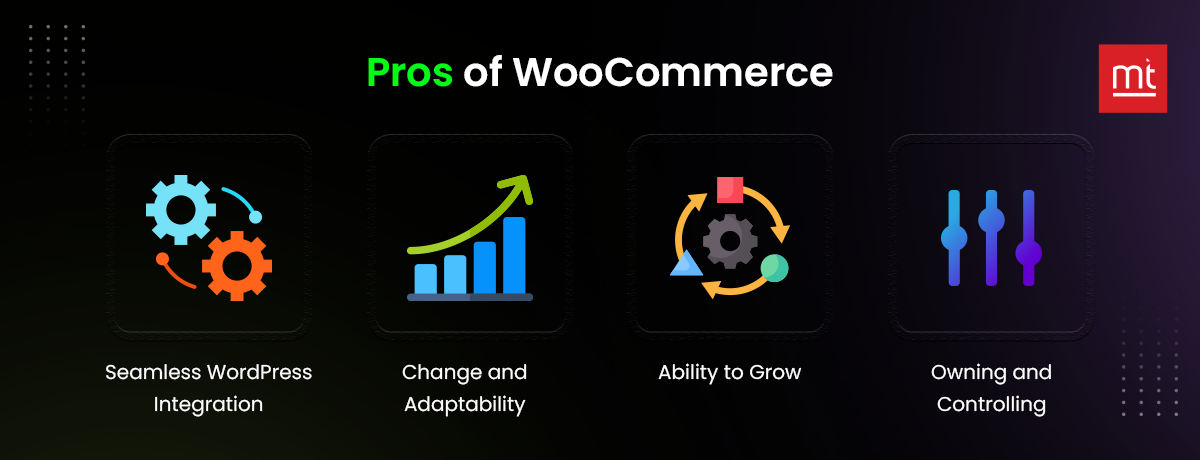
1. Seamless WordPress Integration
WooCommerce's compatibility with WordPress, the world's most popular CMS, is a major benefit. WooCommerce is a WordPress plugin, so users can construct and operate online businesses using WordPress's robust, easy-to-use interface and many features.
2. Change and Adaptability
WooCommerce lets users customize their online businesses to their liking. Customers can customize their shops ' appearance and functionality with hundreds of free, paid themes and applications.
3. Ability to Grow
WooCommerce is simple to scale with your company. Use WooCommerce to handle a large shop or a few goods. It's versatile and scalable, growing with your company without slowing it.
4. Owning and Controlling
WooCommerce is self-hosted, so users own and operate their online stores. WooCommerce has no restrictions like managed systems. Users may customize their web pages, manage their data, and connect to third-party services.
Cons of WooCommerce
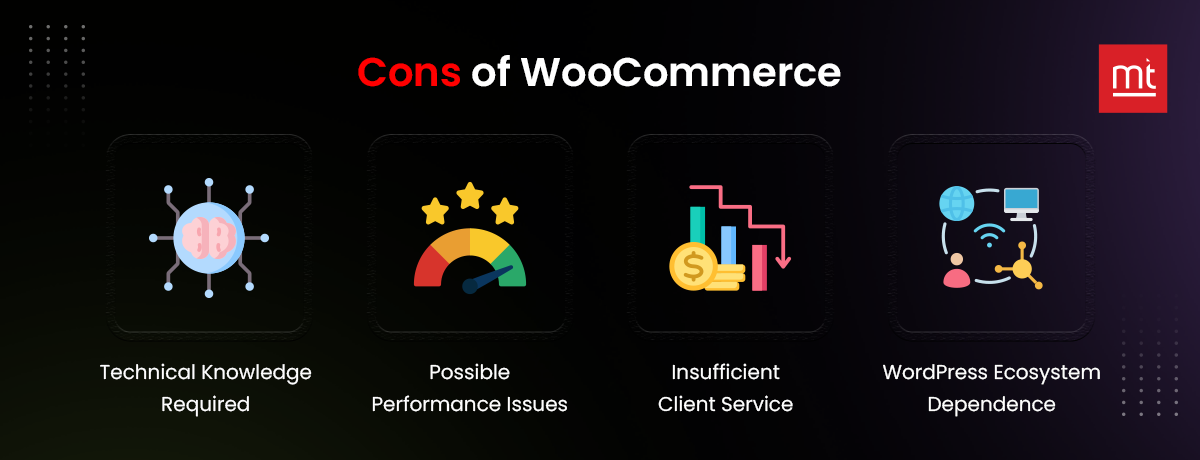
1. Technical Knowledge Required
WooCommerce provides many customization options, but non-techies may struggle to set up and maintain an online business. WordPress, plugins, and technological issues may require users to learn independently.
2. Possible Performance Issues
WooCommerce's WordPress basis may cause site crashes and slow page loads as your business grows and becomes more complex. Improve websites, pay for reliable hosting, and use cache solutions to address performance issues.
3. Insufficient Client Service
WooCommerce includes literature, discussion forums, and user instructions but less specialist customer assistance than Shopify. Users may hire developers or utilize internet tools for technical assistance.
4. WordPress Ecosystem Dependence
Due to its WordPress backbone, WooCommerce customers must cope with WordPress updates. This reliance might cause compatibility issues, or if consumers require support with WordPress capabilities they don't ordinarily supply.
Examples of WooCommerce
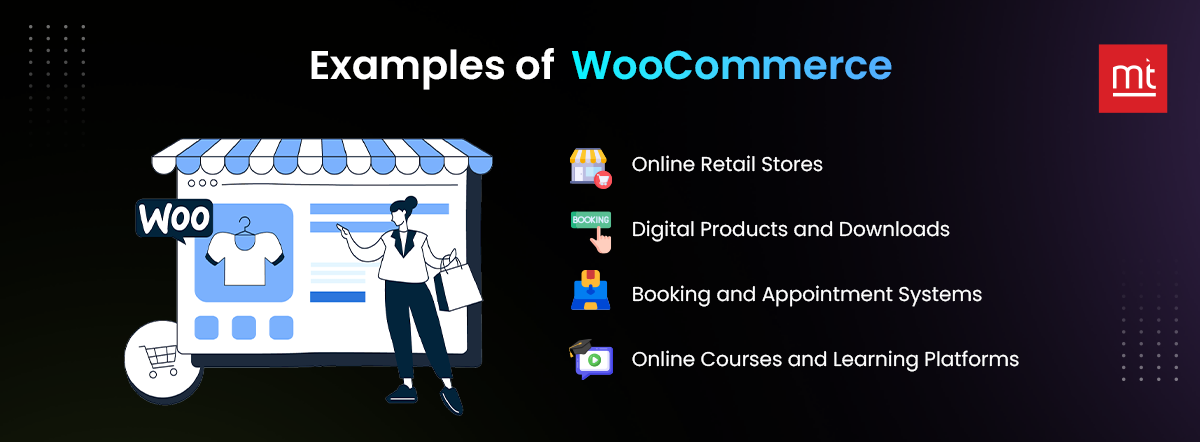
1. Online Retail Stores
For businesses, WooCommerce is utilized to establish and run web-based stores that sell different sorts of products such as clothing, electronics, household goods, etc. WooCommerce allows business owners to make product listings, deal with product stock, process orders, and securely provide payments.
2. Digital Products and Downloads
Besides that, WooCommerce is a fit for companies that offer digital products like e-books, software, music, and videos. At this time, store owners can simply upload digital files, set their own prices, and send out a product immediately upon purchase to customers. This allows for a more straightforward and convenient approach for sellers and consumers.
3. Booking and Appointment Systems
Service-oriented businesses like spas, salons, hotels, and consultations will find use for WooCommerce's appointment and registration system. The availability of WooCommerce plugins, where customers can book appointments, schedule services, and pay online in real time, is an added advantage. It allows businesses to provide a smooth booking process and improve the general customer experience.
4. Online Courses and Learning Platforms
Educational institutions, trainers, coaches, and course creators constantly use WooCommerce to sell educational courses and learning materials online. The use of WooCommerce integrations has industry several sales channels that are not limited to the e-commerce platform. Businesses can create course catalogs, enroll students, track progress, and securely deliver course content to registered users.
What is Shopify?
Businesses may set up and run their online shops with the help of Shopify, an e-commerce platform. Online companies may use its many features and capabilities, such as configurable website layouts, payment processing, inventory management, marketing, and analytics tools, to sell their goods and services online.
Shopify has grown in popularity as an eCommerce platform for companies seeking to open an online storefront quickly and easily, regardless of their size or technological expertise. According to reports, 4.8 million businesses use Shopify.
Advantages of Shopify
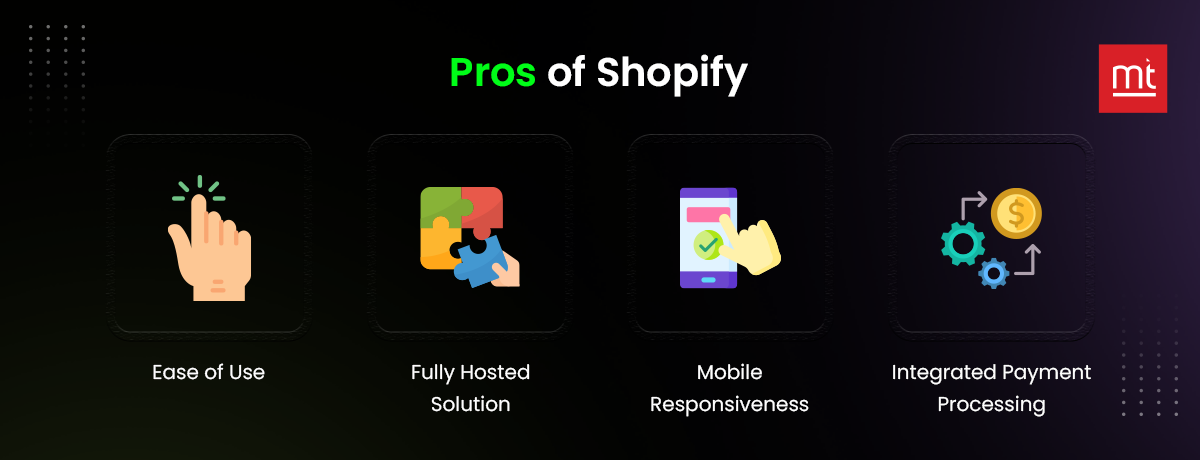
1. Ease of Use
Shopify has a friendly interface, which is one of the critical advantages of the platform. This makes setting up and running online stores easy for even green beginners without too much technical knowledge. The platform boasts users of various levels of technical expertise. It has customizable templates, drag-and-drop functionality, and intuitive navigation, enabling merchants to build beautiful, professional-looking storefronts easily and quickly.
2. Fully Hosted Solution
Shopify provides a fully hosted service, so merchants do not need to be concerned with web hosting or server handling. Shopify handles all the hosting, security, and infrastructure issues and must keep the stores safe, stable, and scalable.
3. Mobile Responsiveness
With the growing number of mobile devices used for internet shopping, Shopify provides merchants with mobile responsive themes and an app they can install to manage their stores from there. The shopping process stays uninterrupted on the customer's mobile, tablet, or laptop, increasing conversion rates and customer satisfaction.
4. Integrated Payment Processing
The best e-commerce platform incorporates in-built payment processing facilities where merchants can accept credit cards, PayPal, Apple Pay, and many other popular payment modes. With their help, merchants can integrate all payment information within Shopify Payments and avoid using external payment gateways. Thus, they can manage all the transactions on the same platform.
Disadvantages of Shopify
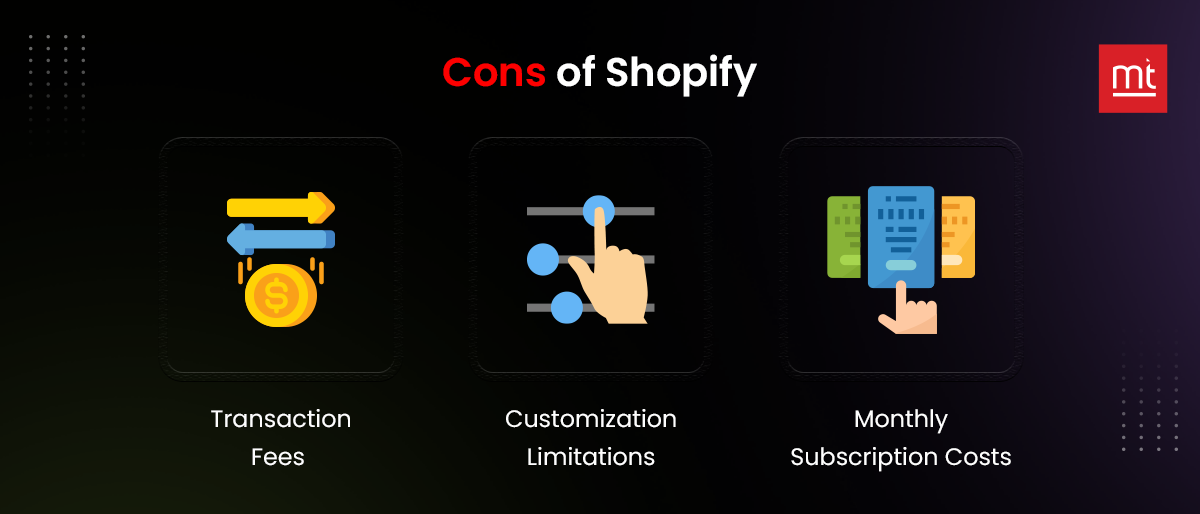
1. Transaction Fees
Despite the number of different pricing plans from Shopify, including a monthly basic plan with a fixed subscription, the merchants may also pay additional transaction fees if they use a third-party payment gateway instead of Shopify Payments for every sale. These transaction fees add up to the point where they affect one's profit margin, which is more apparent for big retailers.
2. Customization Limitations
While Shopify offers many customization choices, the trade-off is that some merchants might find the platform’s customizing capabilities quite limited compared to other e-commerce solutions. Customization of the more advanced type may require understanding these templates' HTML, CSS, and Liquid, Shopify languages.
3. Monthly Subscription Costs
Although Shopify's plans are competitively priced, some merchants might find it hard to cover the monthly subscription costs if they are just beginning to sell or if their business doesn't generate much profit. Nevertheless, Shopify offers a 14-day free trial for merchants to verify the platform before they can subscribe.
Examples of Shopify
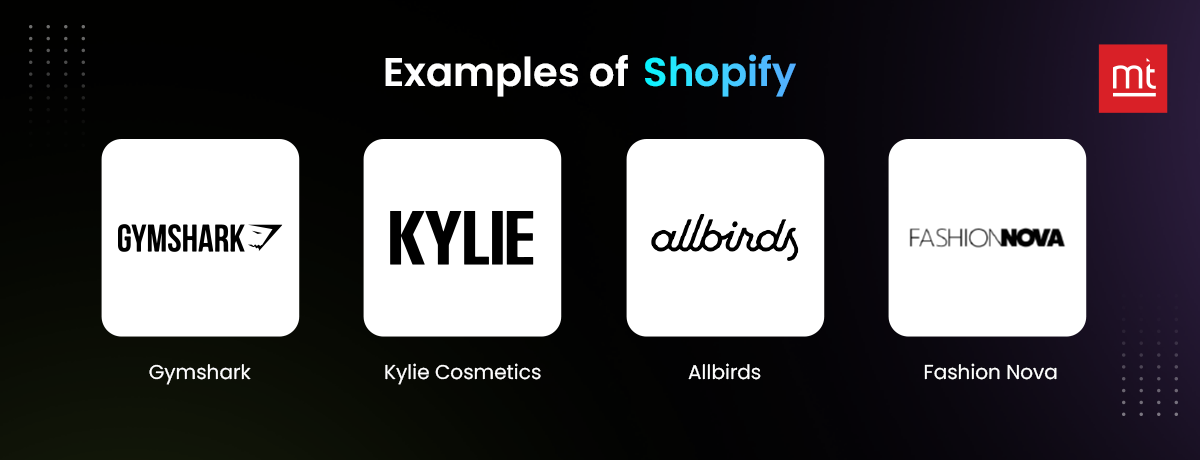
1. Gymshark
Named after a sports gym, Gymshark is a famous sports clothing brand that leverages Shopify to offer easy online shopping opportunities for customers globally. Shopify's theme designer and his rich e-commerce characteristics have added a helping hand to the development of Gymshark into an internationally reliable brand worth millions of dollars.
2. Kylie Cosmetics
Kylie Cosmetics, owned by Kylie Jenner, is an example of the celebrity's use of Shopify to market and sell a range of beauty and make-up products directly to customers. Shopify's seamlessly integrated payment processing and a mobile-friendly shopping experience that is cross-device help Kylie Cosmetics to engage and store users.
3. Allbirds
Allbirds, the popular footwear brand that uses environment-friendly material, relies heavily on Shopify to run its online store and expedite checkout. By means of the scalability and the inbuilt marketing tools from Shopify, Allbirds has grown its global presence and retained faithful customers.
4. Fashion Nova
It is Shopify that enables Fashion Nova, a fast-fashion retailer, to control its e-commerce platform and provide a smooth shopping experience for its patrons. By utilizing the Shopify platform's flexible approach to the design and construction of its scalable infrastructure, the fashion brand Fashion Nova succeeded in growing and modernizing the fashion industry.
Shopify and Woocommerce: Comparison Table
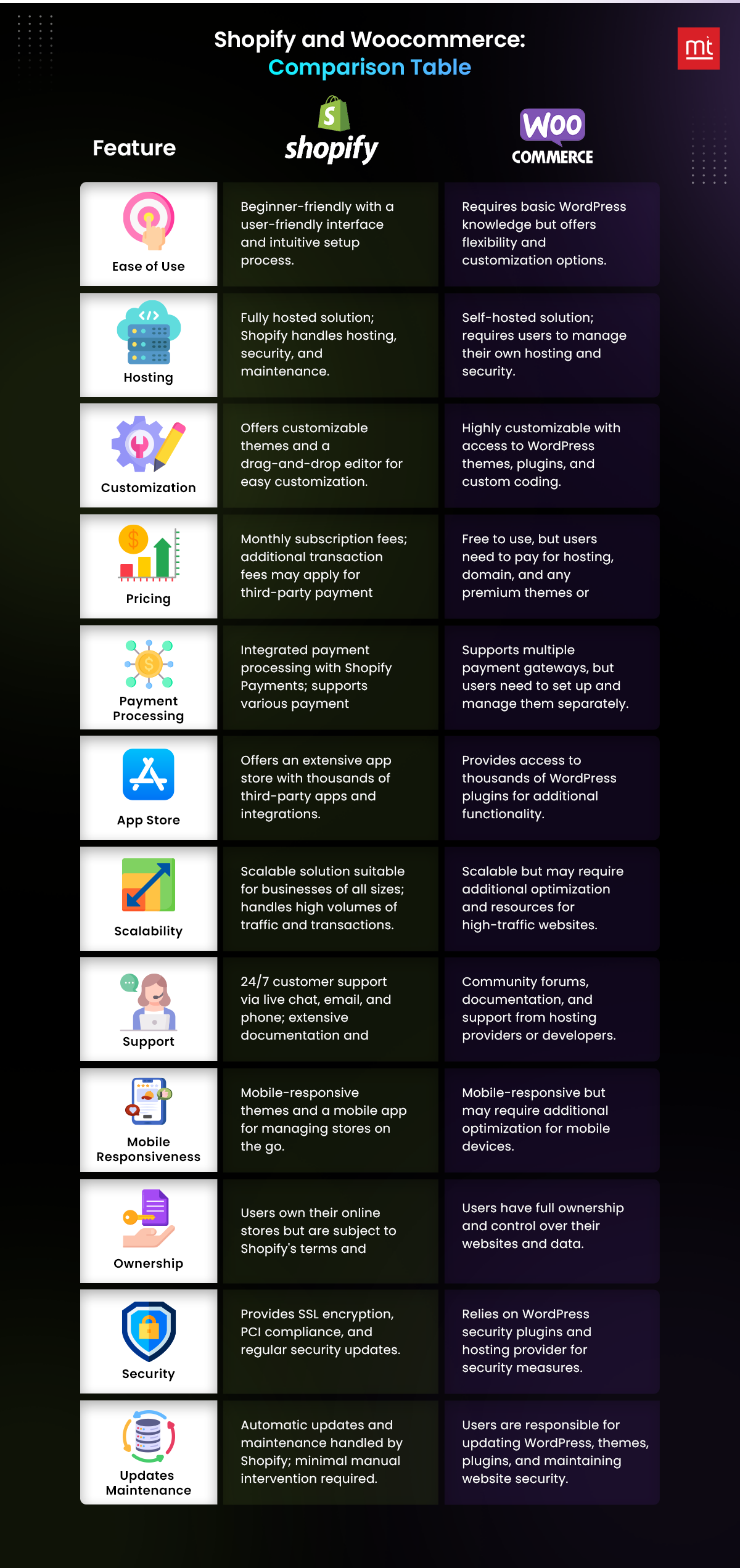
WooCommerce vs Shopify: Which is the Better Choice?
When looking to launch an online store, two strong contenders are Shopify vs WooCommerce, ultimately, it is dependent on your abilities and interests. Here we have put together end to end difference to help you make an informed choice:
#1. Design
Shopify caters to your business needs with professionally designed and mobile-friendly templates that can be customized through the drag-and-drop editor. From WordPress themes, there are tens of thousands of customizable options that come with the usage of WooCommerce. Still, you may need technical expertise to customize your particular needs.
#2. Inventory and Product Management
Shopify provides a robust inventory management function, while WordPress, with the so-called WooCommerce plugin, is great for product management. Shopify is more user-friendly, while WooCommerce provides an array of opportunities to control and customize your store if requested.
#3. Pricing
Shopify works with a subscription-based approach and transaction fees incurring low costs. In contrast, WooCommerce is free and requires extra payments for hosting, domain, and premium themes or plugins. From one to another, it still can be a budget-friendly choice.
#4. Support and Community
Based on Shopify, access to 24/7 customer support and a community is assured. WooCommerce exploits WordPress's community and third-party support but offers abundant documentation and technical forums.
#5. Security
Shopify, in which case, SSL encryption, PCI compliance, and regular updates are assured. WooCommerce utilizes WordPress security protocols and host providers with the extra measure of taking preventive measures from the users required by the user.
#6. Payment Options
Shopify has supported integrated payment processing, while WooCommerce supports multiple payment gateways; both are essential to set up and manage.
#7. Scalability
Shopify is scalable with its cloud infrastructure and WooCommerce scales depend upon the hosting and optimization provider.
#8. Page Speed
Shopify, through speed-oriented infrastructure and individual theme optimization, may achieve quicker page loading.
#9. Design and Templates
Shopify offers a variety of professionally made themes that can be customized by the user. WooCommerce offers users thousands of WordPress themes from which they can choose, and they may need more profound technical skills to apply customization.
#10. Apps and Plugins
Shopify supports a variety of third-party apps and integrations, while WooCommerce provides access to multiple WordPress plugins. Shopify's app store might be rich in customized applications. Still, WordPress, which WooCommerce is installed on top of, offers many plugins, allowing users to customize.
How to Choose the Right E-commerce Platform for Your Online Store?
Selecting the right ecommerce platform is a feat, especially for a person unsure what should be looked at. While platforms like WooCommerce, Shopify, and Squarespace are widely used, it is essential to recognize the unique needs of a store owner to choose the suitable platform for your business. Here are some key factors to consider before selecting an e-commerce platform:
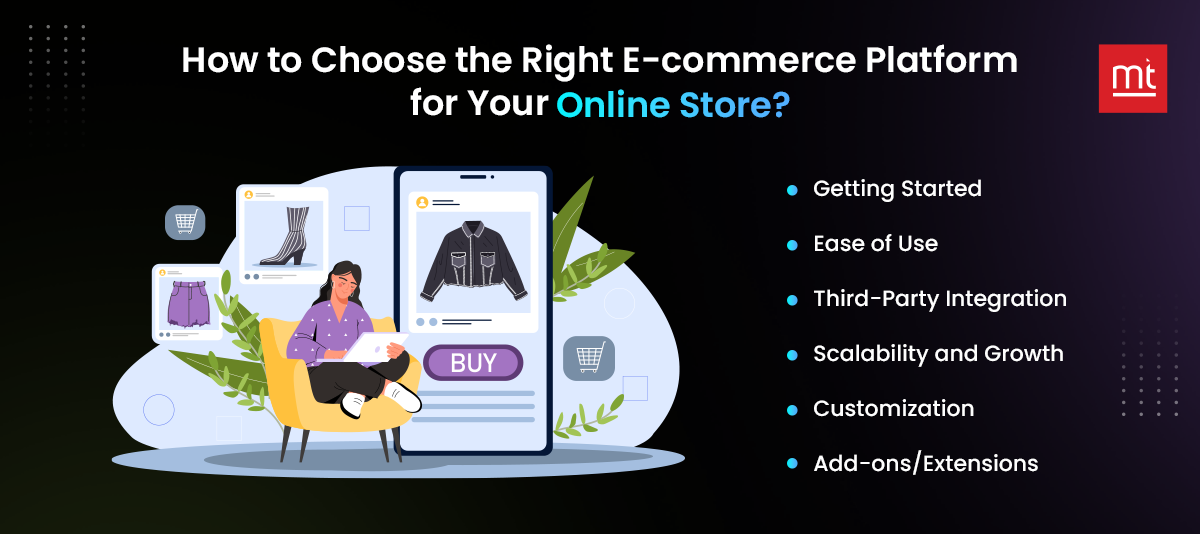
Getting Started
If you are already familiar with WordPress, WooCommerce offers a simple choice. However, your duties with WordPress and WooCommerce will include installing and maintaining the site. In contrast, Shopify is the simplest platform to get started with, as it guides you through the mission of having an e-commerce store without any technical know-how involved.
Ease of Use
Playing the role of an online store owner, you must devote your time to business priorities, which include taking customer reviews, processing orders, and working with suppliers. Search for an ecommerce platform that would give you efficient tools to set up and administer your web store. WooCommerce facilitates payment processing in e-commerce, creating a perfect solution for those who value simplicity.
Third-Party Integration
The e-commerce store operations are accomplished through email marketing tools and social media platform features. Select an e-commerce service provider that can efficiently connect to some of these tools. WooCommerce is an example of this integration with MailChimp.
Scalability and Growth
The e-commerce platform you choose should allow your business to scale without restricting it. Ensure that the selected e-commerce platform provides customization and scalability features to facilitate your business's development in the way you want it to grow.
Customization
UI, or the User Interface, is always the first and the last thing visitors see from a site, proving that it is essential for every e-commerce store. There is no WooCommerce storefront, but you can quickly get themes of top quality and functionality at ThemeForest marketplaces. Make sure the theme you select is light, fast responding, and provides a great picture to users on all devices.
Add-ons/Extensions
Similarly, WooCommerce and Shopify provide the requirements associated with the best e-commerce platform. To increase the platform's capabilities even further, you can choose the extensions and add-ons added to the platform without any hassle. There are a variety of extensions from WooCommerce and more than 489 applications in the Shopify App Store.
How does ManekTech help you Build an eCommerce Platform?
ManekTech is the best development company to take a walk in developing a world-class eCommerce store that aligns with your business needs. We have the best team of developers equipped with world-class expertise to develop an e-commerce platform with an impressive interface that keeps the customer engaged with your brand. Whether you want to develop an e-commerce store with Shopify or WooCommerce, our team of dedicated developers has everything covered under one roof.
If you want to add a custom touch to your existing store or develop a store from scratch that can carry immense products, ManekTech is your go-to partner. Get your footsteps and take an edge towards developing a world-class e-commerce platform with the best development services company.
Conclusion
Shopify and WooCommerce always battle to stay on top for the best online store. To make a happy ending with the right choice, it depends on which platform gives them hands-on growth. Shopify is a breeze. Nothing needs to be installed, and you may start using it immediately, but the control is limited. Whereas you have complete control over your website using WooCommerce because it is open-source.
If you are having trouble developing your online store that aligns with your business requirements, ManekTech is the best eCommerce development company to give you an expert edge at developing a top-notch E-Commerce platform. We have a team of remote developers who know the best practices for developing an e-commerce store where you can showcase a range of products with an easy-to-use interface that rules customers' hearts and minds.
Frequently Asked Questions (FAQs)
1. Is WooCommerce easier than Shopify?
WooCommerce and Shopify are plug-ins and services, respectively, and thus offer different experiences. Because WooCommerce is a WordPress plugin, one will surely have to learn some technical stuff and enjoy high flexibility. Shopify is very user-friendly from the get-go. Select from the multiple options based on whether you are proficient with WordPress or want more than beauty customization on your website.
2. Is it worth moving from WooCommerce to Shopify?
Changing WooCommerce to Shopify might be preferable, considering convenience and scalability. Shopify simplifies the launch process and takes care of technical issues, giving all businesses equal chances. Factors such as store volume, how well you are prepared for scale, and platform features you can comfortably and effectively work with should be considered before migration.
3. Can you migrate between the two platforms?
Indeed, it is possible to move the workflow from WooCommerce to Shopify. Various instruments, services, products, customers, and purchases are transferred from carrier to carrier. Plan carefully to prevent outages and keep data consistent throughout the migration.
4. Are Shopify and Woocommerce reliable e-commerce platforms?
Reliable e-commerce platforms include WooCommerce and Shopify. Shopify leverages the strength of its hosting and technical support to provide users with a good service experience. WooCommerce's reliability depends on your choice of hosting and technical setup. These two shopping platforms enable a flourishing online store for thousands of people worldwide.
5. Is WooCommerce still relevant?
WooCommerce is still useful in many companies. The WP content marketplace WordPress extension adds to its customization capabilities and SEO advantages. Nonetheless, weigh the tech skills you have, store size, and future business expansion against your decision of whether WooCommerce is what you should go for.
Subscribe to Our Newsletter!
Join us to stay updated with our latest blog updates, marketing tips, service tips, trends, news and announcements!


![Social Commerce: The Future of Online Shopping [A Complete Guide]](https://www.manektech.com/storage/blog/image/1723027013.webp)

















